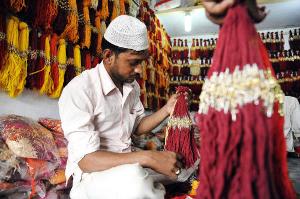 New Delhi, Aug 19: Unemployment among Muslims is going down, marking an encouraging trend to gladden the champions of inclusive growth.
New Delhi, Aug 19: Unemployment among Muslims is going down, marking an encouraging trend to gladden the champions of inclusive growth.
The unemployment rate for the community declined from 2.3% in 2004-05 to 1.9% in 2009-10 in rural areas and from 4.1% to 3.2% in urban areas. However, a vast majority of Muslims in both rural and urban areas are not part of the organized workforce compared to other religious groups.
In contrast, Hindus had a stable unemployment rate of 1.5% in rural areas during the five-year period while it fell from 4.4% to 3.4% in urban India.
According to data released by the National Sample Survey Organization, Muslims are mainly engaged in self-employment and as rural labour.
In cities and towns, Muslims are at the bottom of the ladder in the 'regular wage/salaried' category. Among the major religious groups, only 30.4% of Muslim households are in regular jobs, followed by Sikhs (35.7%), Hindus (41%) and Christians (43%). In contrast, the proportion of households with major source of earning as self-employment was the highest for Muslims (46%) in urban areas.
In villages, Muslims (41%) are the largest group employed as rural labour with another 46.3% in the self-employed category. Majority of households of all religious groups, other than Muslims, belong to the self-employed in agriculture category, the survey found.
In rural areas, the proportion of households depending on self-employment was the highest among Sikhs (48%). The community's major source of earning is self-employment in agriculture (around 36%), followed by Hindus (33%) and Christians (30%).
Around 25% of Muslims are engaged in self-employment in non-agricultural sector, followed by Christians (14.7%), Hindus (14.5%) and Sikhs (12.4%), according to the NSSO data.
The poor state of affairs among Muslims is also reflected in low per capita spending compared to other religious groups. The household monthly per capita consumer expenditure (MPCE), which serves as a proxy for income and is usually taken to reflect the living standard of a family, was lowest among Muslims. Muslim households were spending Rs 980 (Rs 1,272 in urban areas and Rs 833 in rural areas).
The average MPCE (for both urban and rural) was the highest for Sikh households, followed by Christians and Hindus. The average MPCE of a Sikh household was Rs 1,659 (Rs 2,180 in urban areas and Rs 1,498 in rural areas).





Comments
Add new comment